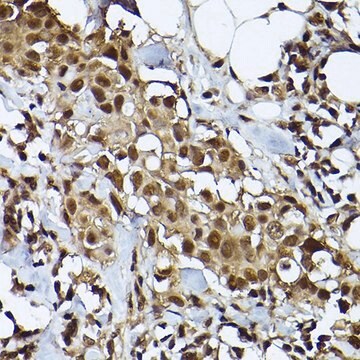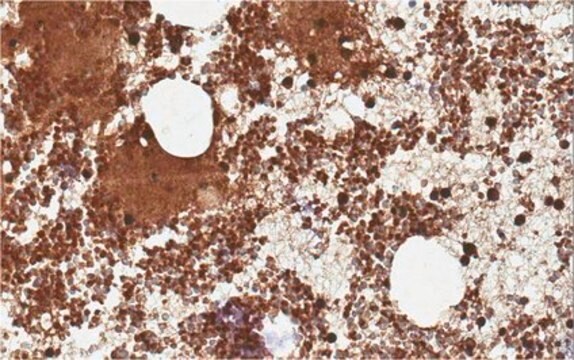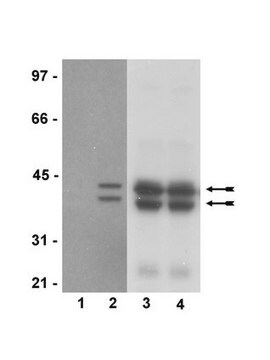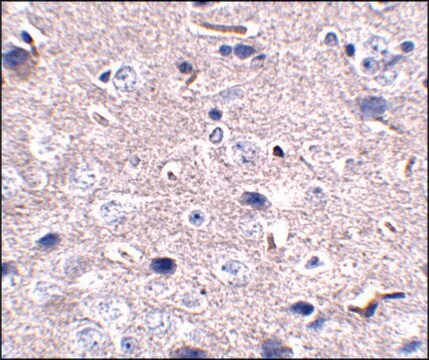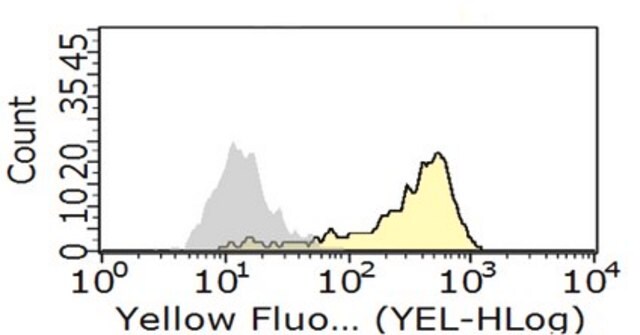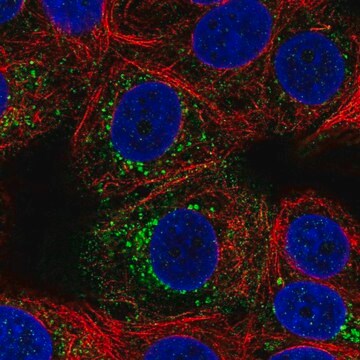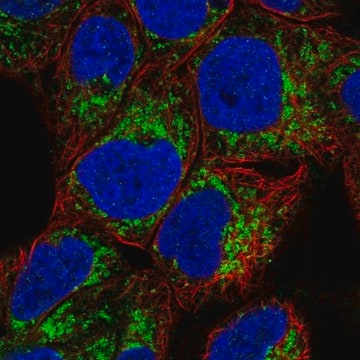おすすめの製品
由来生物
mouse
品質水準
抗体製品の状態
purified immunoglobulin
抗体製品タイプ
primary antibodies
クローン
4F5, monoclonal
化学種の反応性
human
テクニック
flow cytometry: suitable
immunocytochemistry: suitable
immunohistochemistry: suitable (paraffin)
immunoprecipitation (IP): suitable
western blot: suitable
アイソタイプ
IgG1κ
NCBIアクセッション番号
UniProtアクセッション番号
輸送温度
dry ice
ターゲットの翻訳後修飾
unmodified
遺伝子情報
human ... FCGR2B(2213)
詳細
FcγRI/CD64, FcγRII/CD32, FcγRIII/CD16, and FcγRIV/CD16-2 represent the four known classes of IgG Fc receptors (FcγRs). FcγRII, FcγRIII, and FcγRIV are low-affinity receptors for monomeric IgG, whereas FcγRI is the only high-affinity FcγR. FcγRs play important roles in inflammatory cell activation, clearance, presentation of Ag, and maintenance of IgG homeostasis. In addition to binding immune complex (IC), FcγRs have been shown to bind non-IgG ligands. For example, FcγRII is shown to bind oxLDL, while FcγRIII binding to an E. coli component is reported to negatively regulate the function of macrophage receptor with collagenous structure (MARCO). FcyRII activation is also reported to transduce a negative regulatory signal against CD38 crosslinking-induced proliferation of resting mature B cells. Low affinity immunoglobulin gamma Fc region receptor II-a/b/c (IgG Fc receptor II-a/-b/-c, CDw32, Fc-gamma RII-a/-b/-c, Fc-gamma-RIIa/b/c, FcRII-a/-b/-c, CD32) are encoded by the FCGR2A/B/C (CD32, FCG2, IGFR2) genes in human (UniProt P12318, P31994, P31995; Gene ID 2212, 2213, 9103). The FcγRIIs encoded by the three genes are highly conserved in their extracellular portion, with significant variation in the transmembrane and intracellular regions. All three types of transcripts alternative splicing to generate additional isoforms.
特異性
Clone 4F5 recognizes human FcγRIIb and FcγRIIc, but not any of the two polymorphic forms of human FcγRIIa with either Arg131 or His131 (Li, X., et al. (2013). Sci. Transl. Med. 5(216):216ra175; Su, K., et al. (2007). J. Immunol. 178(5):3272-3280). Expected to bind all spliced isoforms of human FCGR2B and FCGR2C reported by UniProt (P31994 & P31995).
免疫原
Epitope: Extracellular domain.
Recombinant human FcγRIIb extracellular domain.
アプリケーション
Research Category
炎症及び免疫
炎症及び免疫
Research Sub Category
免疫グロブリン及び免疫
免疫グロブリン及び免疫
Anti-FcγRIIb/c Antibody, clone 4F5 is an antibody against FcγRIIb/c for use in Immunohistochemistry (Paraffin), Flow Cytometry, Immunoprecipitation, Western Blotting, Immunocytochemistry.
Immunohistochemistry Analysis: A 1:50 dilution from a representative lot detected FcγRIIb/c immunoreactivity in germinal center cells in human tonsil tissue sections.
Flow Cytometry Analysis: A representative lot was conjugated with Alexa Fluor™ 647 and detected (at 10 µg/mL) FcγRIIb/c immunoreactivity among the CD19+ B lymphocytes population in human whole blood (Courtesy of Dr. Jeffrey C. Edberg, University of Alabama at Birmingham, USA).
Flow Cytometry Analysis: A representative lot was conjugated with Alexa Fluor 488 and detected FcγRIIb/c immunoreactivity on the surface of EBV-transformed human B cells from various donors (Li, X., et al. (2013). Sci. Transl. Med. 5(216):216ra175).
Flow Cytometry Analysis: A representative lot was conjugated with Alexa Fluor 488 and employed to detect FcγRIIb expression on various human PBMC populations. Highest FcγRIIb level was found on CD19+ B lymphocytes, while lower expression was found among CD14+ monocytes/neutrophils and CD3+ T-cells were negative of FcγRIIb staining (Su, K., et al. (2007). J. Immunol. 178(5):3272-3280).
Flow Cytometry Analysis: Clone 4F5 hybridoma supernatant immunostained murine B lymphoma IIA1.6 cells expressing exogenously transfected human FcγRIIb, but not any of the two polymorphic forms of human FcγRIIa with either Arg131 or His131 (Su, K., et al. (2007). J. Immunol. 178(5):3272-3280).
Immunoprecipitation Analysis: A representative lot immunoprecipitated both FcγRIIb and FcγRIIc from EBV-transformed human B cells and primary human CD19+ cells (Li, X., et al. (2013). Sci. Transl. Med. 5(216):216ra175).
Immunoprecipitation Analysis: A representative lot immunoprecipitated exogenously expressed human FcγRIIb, but not any of two polymorphic forms of human FcγRIIa with either Arg131 or His131 from murine B lymphoma IIA1.6 transfectants expressing the respective human proteins (Su, K., et al. (2007). J. Immunol. 178(5):3272-3280).
Western Blotting Analysis: A representative lot detected exogenously expressed human FcγRIIb, but not any of two polymorphic forms of human FcγRIIa with either Arg131 or His131 in lysates from murine B lymphoma IIA1.6 transfectants (Su, K., et al. (2007). J. Immunol. 178(5):3272-3280).
Immunocytochemistry Analysis: A representative lot was conjugated with Alexa Fluor 488 and detected FcγRIIb/c immunoreactivity on the surface of EBV-transformed human B cells from various donors (Li, X., et al. (2013). Sci. Transl. Med. 5(216):216ra175).
Functional Analysis: Cross-linking by goat anti-mouse IgG (GαM) of clone 4F5 F(ab′)2-bound human FcγRIIb and endogenous surface IgG-BCR on IIA1.6 murine B lymphoma cells expressing transfected human FcγRIIb resulted in a reduced calcium response than that triggered by GαM in the absence of clone 4F5 F(ab′)2. Cross-linking of FcγRIa with clone 4F5 F(ab′)2-bound human FcγRIIb on the surface of U937 cells likewise reduced the calcium response triggered by FcγRIa cross-linking alone (Su, K., et al. (2007). J. Immunol. 178(5):3272-3280).
ELISA Analysis: Clone 4F5 hybridoma supernatant detected recombinant extracellular domain (EC) of human FcγRIIb, but not any of the two polymorphic forms of recombinant human FcγRIIa ECs with either Arg131 or His131 (Su, K., et al. (2007). J. Immunol. 178(5):3272-3280).
Flow Cytometry Analysis: A representative lot was conjugated with Alexa Fluor™ 647 and detected (at 10 µg/mL) FcγRIIb/c immunoreactivity among the CD19+ B lymphocytes population in human whole blood (Courtesy of Dr. Jeffrey C. Edberg, University of Alabama at Birmingham, USA).
Flow Cytometry Analysis: A representative lot was conjugated with Alexa Fluor 488 and detected FcγRIIb/c immunoreactivity on the surface of EBV-transformed human B cells from various donors (Li, X., et al. (2013). Sci. Transl. Med. 5(216):216ra175).
Flow Cytometry Analysis: A representative lot was conjugated with Alexa Fluor 488 and employed to detect FcγRIIb expression on various human PBMC populations. Highest FcγRIIb level was found on CD19+ B lymphocytes, while lower expression was found among CD14+ monocytes/neutrophils and CD3+ T-cells were negative of FcγRIIb staining (Su, K., et al. (2007). J. Immunol. 178(5):3272-3280).
Flow Cytometry Analysis: Clone 4F5 hybridoma supernatant immunostained murine B lymphoma IIA1.6 cells expressing exogenously transfected human FcγRIIb, but not any of the two polymorphic forms of human FcγRIIa with either Arg131 or His131 (Su, K., et al. (2007). J. Immunol. 178(5):3272-3280).
Immunoprecipitation Analysis: A representative lot immunoprecipitated both FcγRIIb and FcγRIIc from EBV-transformed human B cells and primary human CD19+ cells (Li, X., et al. (2013). Sci. Transl. Med. 5(216):216ra175).
Immunoprecipitation Analysis: A representative lot immunoprecipitated exogenously expressed human FcγRIIb, but not any of two polymorphic forms of human FcγRIIa with either Arg131 or His131 from murine B lymphoma IIA1.6 transfectants expressing the respective human proteins (Su, K., et al. (2007). J. Immunol. 178(5):3272-3280).
Western Blotting Analysis: A representative lot detected exogenously expressed human FcγRIIb, but not any of two polymorphic forms of human FcγRIIa with either Arg131 or His131 in lysates from murine B lymphoma IIA1.6 transfectants (Su, K., et al. (2007). J. Immunol. 178(5):3272-3280).
Immunocytochemistry Analysis: A representative lot was conjugated with Alexa Fluor 488 and detected FcγRIIb/c immunoreactivity on the surface of EBV-transformed human B cells from various donors (Li, X., et al. (2013). Sci. Transl. Med. 5(216):216ra175).
Functional Analysis: Cross-linking by goat anti-mouse IgG (GαM) of clone 4F5 F(ab′)2-bound human FcγRIIb and endogenous surface IgG-BCR on IIA1.6 murine B lymphoma cells expressing transfected human FcγRIIb resulted in a reduced calcium response than that triggered by GαM in the absence of clone 4F5 F(ab′)2. Cross-linking of FcγRIa with clone 4F5 F(ab′)2-bound human FcγRIIb on the surface of U937 cells likewise reduced the calcium response triggered by FcγRIa cross-linking alone (Su, K., et al. (2007). J. Immunol. 178(5):3272-3280).
ELISA Analysis: Clone 4F5 hybridoma supernatant detected recombinant extracellular domain (EC) of human FcγRIIb, but not any of the two polymorphic forms of recombinant human FcγRIIa ECs with either Arg131 or His131 (Su, K., et al. (2007). J. Immunol. 178(5):3272-3280).
品質
Evalulated by Immunohistochemistry in human pancreas tissue.
Immunohistochemistry Analysis: A 1:50 dilution of this antibody detected FcγRIIb/c immunoreactivity in Islets of Langerhans in human pancreas tissue sections.
Immunohistochemistry Analysis: A 1:50 dilution of this antibody detected FcγRIIb/c immunoreactivity in Islets of Langerhans in human pancreas tissue sections.
ターゲットの説明
29.49 kDa (FcγRIIB1), 27.39 kDa (FcγRIIB2), 29.22 kDa (FcγRIIB3), 31.03 kDa (FcγRIIC1), 25.69 kDa (FcγRIIC2), 24.82 kDa (FcγRIIC3), 21.35 kDa (FcγRIIC4) calculated.
物理的形状
Protein G Purified
Format: Purified
Purified mouse monoclonal IgG1κ antibody in PBS without preservatives.
保管および安定性
Stable for 1 year at -20°C from date of receipt.
Handling Recommendations: Upon receipt and prior to removing the cap, centrifuge the vial and gently mix the solution. Aliquot into microcentrifuge tubes and store at -20°C. Avoid repeated freeze/thaw cycles, which may damage IgG and affect product performance.
Handling Recommendations: Upon receipt and prior to removing the cap, centrifuge the vial and gently mix the solution. Aliquot into microcentrifuge tubes and store at -20°C. Avoid repeated freeze/thaw cycles, which may damage IgG and affect product performance.
その他情報
Concentration: Please refer to lot specific datasheet.
法的情報
ALEXA FLUOR is a trademark of Life Technologies
免責事項
Unless otherwise stated in our catalog or other company documentation accompanying the product(s), our products are intended for research use only and are not to be used for any other purpose, which includes but is not limited to, unauthorized commercial uses, in vitro diagnostic uses, ex vivo or in vivo therapeutic uses or any type of consumption or application to humans or animals.
適切な製品が見つかりませんか。
製品選択ツール.をお試しください
保管分類コード
12 - Non Combustible Liquids
WGK
WGK 2
引火点(°F)
Not applicable
引火点(℃)
Not applicable
適用法令
試験研究用途を考慮した関連法令を主に挙げております。化学物質以外については、一部の情報のみ提供しています。 製品を安全かつ合法的に使用することは、使用者の義務です。最新情報により修正される場合があります。WEBの反映には時間を要することがあるため、適宜SDSをご参照ください。
Jan Code
MABF842:
試験成績書(COA)
製品のロット番号・バッチ番号を入力して、試験成績書(COA) を検索できます。ロット番号・バッチ番号は、製品ラベルに「Lot」または「Batch」に続いて記載されています。
ライフサイエンス、有機合成、材料科学、クロマトグラフィー、分析など、あらゆる分野の研究に経験のあるメンバーがおります。.
製品に関するお問い合わせはこちら(テクニカルサービス)